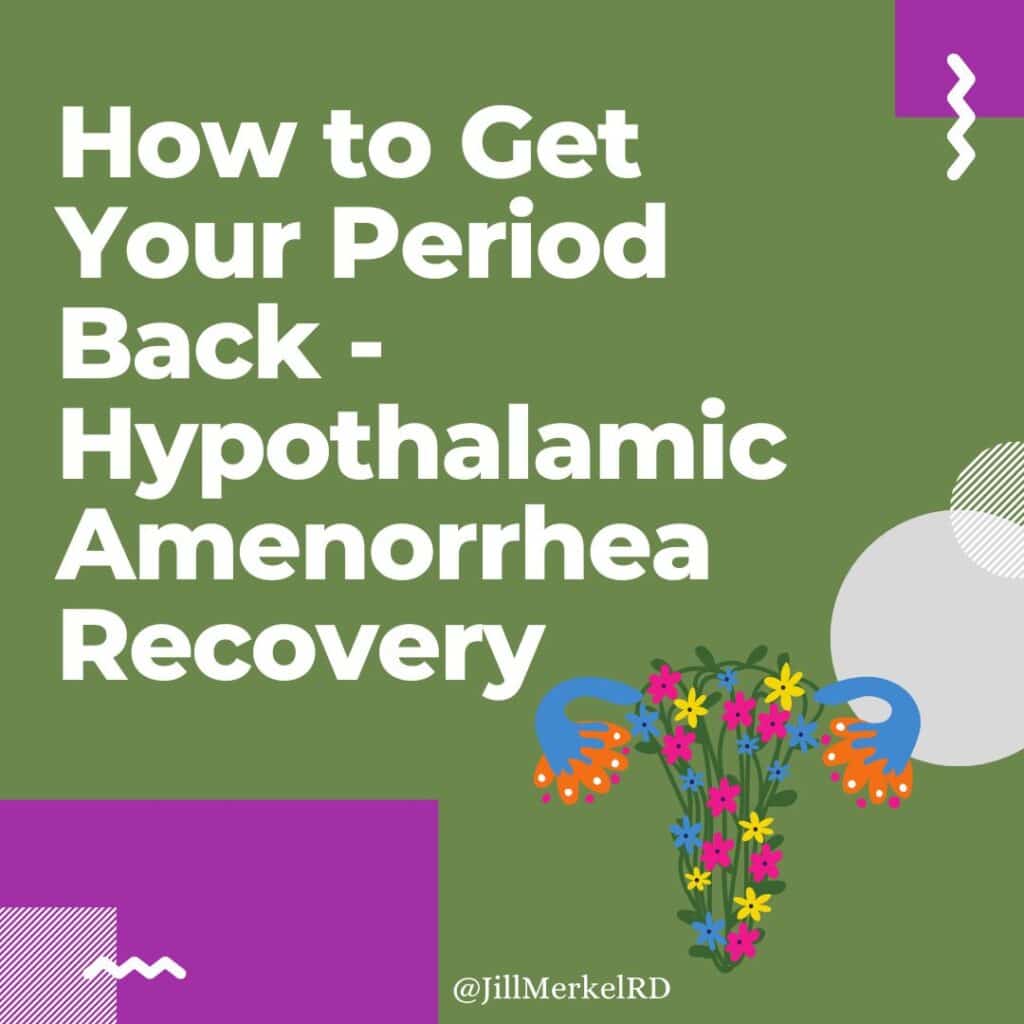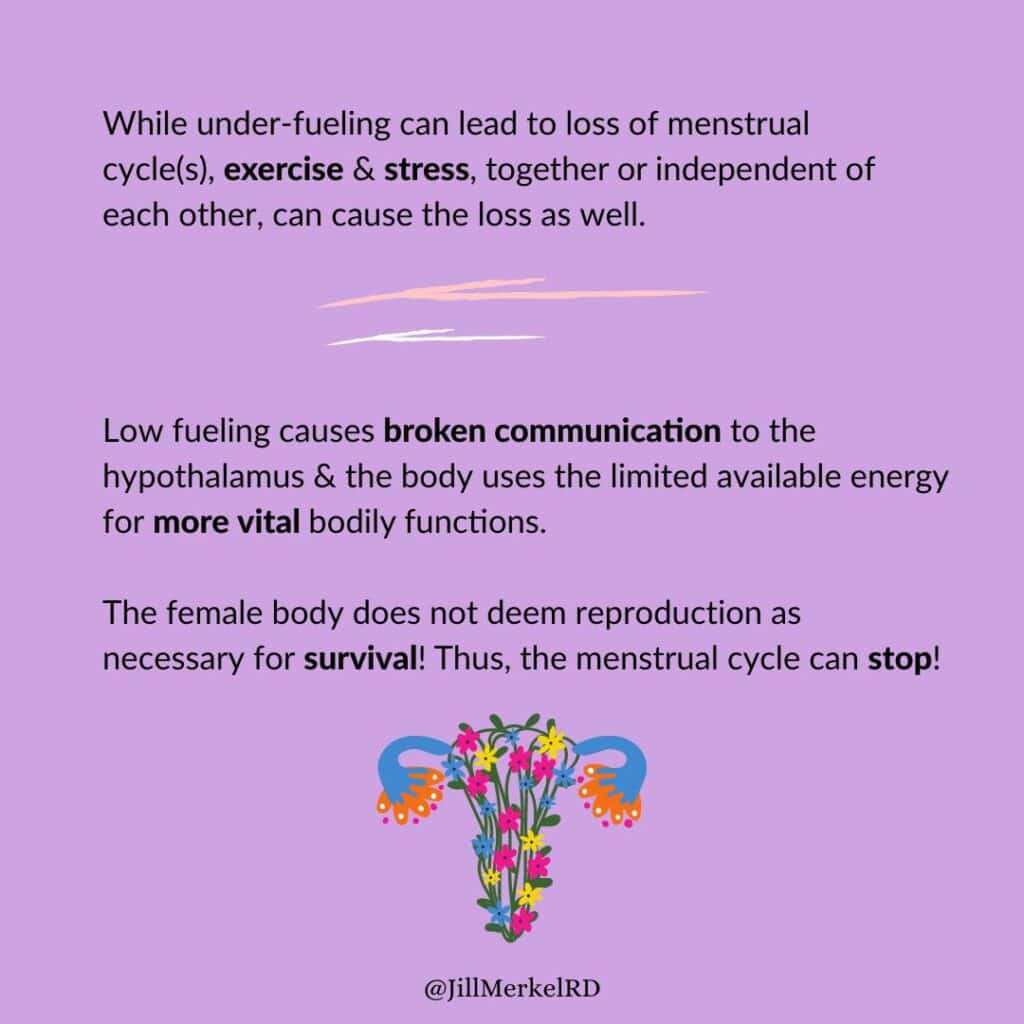A female’s menstrual cycle (or lack thereof) provides valuable insight into hormonal health and potential hormonal imbalances. This article goes into detail about how to get your period back and hypothalamic amenorrhea recovery.
So if you’ve lost your menstrual cycle and are struggling to understand why or wondering how to get your period back, this article is for you!
Let’s dive in…

What is Hypothalamic Amenorrhea?
The menstrual cycle is a monthly hormonal cycle that prepares a female for pregnancy. It has various hormones and phases and provides insight into hormonal health and potential hormone imbalances. Amenorrhea is the loss of the menstrual cycle.
Primary amenorrhea is when someone has not had a first period by age 15. Secondary amenorrhea, of which hypothalamic amenorrhea (HA) is part of, is when someone has had a first period but then loses their menstrual cycle for three or more periods in a row.
HA is a component of Relative Energy Deficiency in Sports (RED-S) or what was previously known as the Female Athlete Triad and is the primary cause for secondary amenorrhea.
Why does Hypothalamic Amenorrhea Occur?
HA occurs for a number of reasons that result in an imbalance in hormones. The most common reasons for HA to occur is lifestyle factors, including inadequate nutrition intake, excessive exercise, and high stress. HA is a common occurrence among athletes and active individuals.

Low body weight or a significant loss of body weight can disrupt normal hormone functions, causing a loss of the menstrual cycle. This can occur with disordered eating and clinical eating disorders. It is also common among endurance athletes and other aesthetic-based sports.
However, one does not have to have low body weight or low body fat in order to have inadequate nutrition intake or HA. Someone who is under fueling their body, either intentionally or unintentionally, can get HA regardless of their body size.
Excessive exercise or an imbalance between energy expenditure and energy intake, can also cause the loss of periods. This can be due to the high stress and physical demands of the exercise and again, is common among endurance athletes and other aesthetic-based sports.
Stress is another factor that can impact one’s hormones. Stress increases cortisol and can impact the hypothalamus, which controls the hormones that regulate the menstrual cycle.
Warning Signs of Hypothalamic Amenorrhea
Early warning signs of HA include frequent injuries or illnesses, which may be indicative of a lowered immune system. Also, low energy, overall fatigue and not recovering from workouts can all be signs of HA.
Low body weight or low body fat may be a warning sign of HA. However, someone with HA does NOT have to have low body weight. And many with low body weight or body fat may be suffering from RED-S, disordered eating, or an eating disorder and still continue to get their menstrual cycle regularly.
Weight loss has been more highly correlated with HA than a low body weight. The authors of No Period, Now What found that 82% of survey respondents had lost 10 or more pounds prior to acquiring HA.
Loss of bone density, if measured, or if frequent bone injuries occur, is another sign of HA and improper overall nutrition. Hormones, in particular estrogen, play a major role in bone development and metabolism. In one study of 24 women with HA, 83% were diagnosed with osteopenia (low bone density that can lead to osteoporosis).
Who Hypothalamic Amenorrhea Can Happen To
Truly any person, regardless of level of exercise or body shape or size, can experience HA. It is not something that only happens to “underweight” individuals or those that compete at a high level.
Additionally, HA happens due to imbalances of the hormones, which again can be caused by low energy intake, excessive exercise, disordered eating, eating disorders, stress, and more.
Studies show that approximately 50% of women who exercise on a regular basis experience abnormal menstrual cycles and about 30% have amenorrhea.
Consequences of Hypothalamic Amenorrhea
Although it used to be, and still sometimes is, seen as a “normal” thing that happens among female athletes, HA is not something to be taken lightly. Having HA can affect one’s physiological, emotional, mental and relational health.
Because HA is most commonly a result of low energy availability (or an imbalance between energy intake and output), many health and performance consequences can occur.
Some health and performance consequences of HA include:
- Hinders growth and development
- Gastrointestinal (GI) issues
- Increased injury risk
- Decreased exercise performance
- Decreased training response
- Inability to sleep
- Decreased muscle strength
- Decreased glycogen (carb/energy) stores
- Loss of bone mass and density
- Decreased concentration
- Impaired judgment
- Depression
- Anxiety
Hypothalamic Amenorrhea Recovery – How to Get Your Period Back
Recovery from HA is essential in order to prevent long-term consequences such as loss of bone mass or bone density and infertility. While HA is reversible when treated, untreated and prolonged HA can impact reproductive health.
The first step to recovery and getting your period back is to determine the root cause of the HA. If it is due to a health condition such as PCOS or thyroid malfunction, you will want to get treatment for those specific conditions.
If there are no known medical problems or medications that may be causing the HA, then looking at lifestyle factors is the next course of action.
Increasing caloric intake, decreasing training volume, or both is often necessary for someone experiencing HA. This is to get the body back to a proper energy balance. If possible, getting bone density & hormone levels tested can help to see how the HA is impacting the body.
Consume more calories.
This may be a daunting concept for some individuals. Consuming more food may be physically and mentally uncomfortable. However, if you have HA, the amount of food you are consuming is not enough to stimulate the hypothalamus to activate reproductive signals.
Some options for increasing caloric Intake:
- Choose more calorie dense foods (nuts/seeds, avocados, full fat dairy, nut butters, fatty fish, full fat dressings, & smoothies with Greek yogurt)
- Eat from all food groups, including carbs
- Consume more snacks throughout the day
- Eat something every 2-4 hours
Decrease exercise.
If you are exercising and not getting your period, you are most likely not consuming enough food to adequately fuel your current training. It is recommended to eliminate all high-intensity exercise while increasing overall calories.
Eliminating exercise may be difficult mentally. Here are some tips:
- Realize that exercise is not your identity, it is just one part of your life
- Think of reasons to appreciate your body other than exercise
- Learn new skills or hobbies
- Surround yourself with support
- Enjoy mindful exercise, like yoga & walking
- Experience the emotions that come up from not exercising
This may be difficult if you are in collegiate or professional sports. Discuss with your sports dietitian the loss of your period & how to get your period back. Sports RDs should consult with the multidisciplinary team about whether the athlete’s training intensity and/or duration should decrease.
Monitor and decrease stress levels.
Stress alone can cause the absence of menstrual cycles. Monitoring stress levels & being proactive about how to handle them can help regain cycles & improve overall quality of life!
Ways to decrease & manage stress:
- Learn a new skill or hobby
- Meditate or deep breathing
- Listen to music or a podcast
- FaceTime a friend & have a laugh
- Snuggle with a pet
- Light a candle, get a blanket, & journal
- Talk to a therapist
Recovery from HA will likely (but not always) require an increase in body weight. In general, studies have found that recovery of the menstrual cycle seems to require about 2 kg (4.4 lbs) more than the weight of the woman at the time at which menses were lost(1). Working with a Registered Dietitian and/or mental health professional trained in working with disordered eating and eating disorders will be helpful in your recovery process and getting your period back.
Please note, birth control pills (BCPs) are NOT recommended for restoring menstrual cycles or maintaining bone density! When menstrual cycles are absent or irregular, estrogen levels are low. Doctors may suggest BCPs to regain cycles because they contain estrogen and/or progesterone.
However, BCPs cause an artificial period that does not accurately indicate one’s health. The underlying issue of suboptimal calories & excessive exercising is NOT addressed & will continue to cause long-term health effects.
How Long Will Hypothalamic Amenorrhea Recovery Take?
HA recovery looks different for everyone. Variables impacting time include age, how quickly weight is restored, exercise level, amount of stress, genetics, and how sensitive the woman’s system is to energy balance. It also depends on how willing the individual is to go “all in” with recovery.
In the wonderful book, No Period, Now What, Nicola Rinaldi finds that the average recovery time is about 8 months (with some being shorter and some being longer to get their period back). She also has many stories of HA recovery on her website and blog.
Conclusion
If you are having irregular or missing periods, please know you are not alone and that you can recover from this! Hypothalamic amenorrhea occurs for a number of reasons and is not something to be taken lightly. There are serious health consequences related to HA if treatment is not had. I hope this article has helped you to understand how to get your period back.
Additional Hypothalamic Amenorrhea Resources
No Period, Now What book by Nicola Rinaldi
I absolutely love Lauren Fleshman’s Dear Younger Me letter. It’s a great resource for young athletes to hear from a former professional athlete about their real-life experience struggling with fueling their body properly.

Research Articles
- J Pape, A E Herbison, B Leeners, Recovery of menses after functional hypothalamic amenorrhoea: if, when and why, Human Reproduction Update, Volume 27, Issue 1, January-February 2021, Pages 130–153, https://doi.org/10.1093/humupd/dmaa032
- Shufelt CL, Torbati T, Dutra E. Hypothalamic Amenorrhea and the Long-Term Health Consequences. Semin Reprod Med. 2017 May;35(3):256-262. doi: 10.1055/s-0037-1603581. Epub 2017 Jun 28. PMID: 28658709; PMCID: PMC6374026.
Looking for More?
Worried You Are Under Fueling? Download my Free Guide on Relative Energy Deficiency in Sports (RED-S).
Individual Nutrition Coaching – if you’re looking for more individualized support, check out my options for working together one on one.
Intuitive Eating Support Group for Women – if you’re interested in learning more about Intuitive Eating and healing your relationship with food and exercise, this is the group for you!

